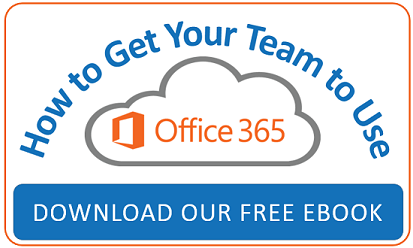 When it’s time for your employees to master Excel, or even step up their game a bit, you probably already have a hunch that you can do it completely online.
When it’s time for your employees to master Excel, or even step up their game a bit, you probably already have a hunch that you can do it completely online.
We’re here to point out the advantages and pitfalls of any attempts you might make to learn Excel online, and offer the benefit of our years of experience!
Learn Excel using an online strategy
Just to clarify, this post is about using online resources to learn the Excel desktop application. Not to be confused with the web-based version of the application called Excel Online, which comes with Office 365 and provides easy access to a subset of Excel functionality. You can learn Excel Online on this Microsoft site or you can get a free KnowledgeWave trial and watch some training videos.
The most used business software of our time
Excel is exceedingly handy in a number of professional capacities. It is by far the software that we are requested to teach most often, meaning that it is also probably the most used business software on the market.
In this article, Laurence Shatkin uses U. S. Department of Labor data to illustrate how command of Excel can boost earning power. He points out that, “Financial careers are not the only Excel-using jobs in the high-skill zone.”
You are smart for wanting to learn Excel online, and you're not alone in that. Now let’s get to the list of tips.
1. Find a curated source
Curriculum matters. There are gobs and gobs of free Excel tutorials and reference sites available. And many of them are great, but you want to learn Excel online, not explore every nook and cranny of the World Wide Web.
I found a blog post to help me “learn Excel without spending a penny” which lists 43 good quality resources. Yeesh! I already wasted $20 of my company’s time just scanning through the list, nevermind actually visiting the sites and sifting through to find the content I need.
If you aren’t an Excel expert already, it can be difficult (and costly) to chart your own course. Find a resource that has courses already laid out for you and materials that offer a clear path to mastery.
If you leave your whole team to find their own way in Excel, try this handy formula: (time spent seeking quality online learning resources) * (total number of employees) * (average hourly wage) = the amount of money your organization would be bleeding with this approach. Please find a high quality curated source for training and learning information for your team.
2. Practice makes permanent
You can watch videos and read tutorials until the cows come home (yes, I live in dairy farming country). Just make sure you have the opportunity to put your new skills into practice as soon as possible if you want to have a prayer of remembering them a few weeks down the road. We've written before about the importance of practice and mistakes.
What does this look like with online training? Watch videos that provide practice files where you can follow along with the steps. Or attend online classes with time for exercises included: the instructor can watch “over your shoulder” and provide guidance where needed.
At the very least, build a little time into your training schedule to sit and practice after you learn a lesson, preferably with a “play” copy of some real data that has real-world relevance to your work.
3. Use blended learning
Blended learning simply uses a mix of training strategies to deliver the best results. In your strategy to learn Excel online, you might blend self-serve training such as recorded videos with live events like webinars and classes.
This is especially important if you are training a team. Individuals learn differently, and what works great for one person will make another’s eyes glaze over.
For some learners, videos and self-study tutorials are all they need. But some learners really benefit from that live instructor guiding them through the material, and you can still get that online; virtual classroom technology is fairly ubiquitous these days.
4. Find training materials that match the version you are using
Some of the online resource you will find are informative and…ancient. I found some Excel wikis from 1995!
Granted, much of the core functionality and main functions have remained steady throughout the years, but buttons and menus are updated and handy time-saving features are added with each release.
Plus, it’s disconcerting to learn a new skill and not be able to find it in your version on your own computer. You want to make the pathway to Excel mastery as barrier-free as possible. If your team has Office 2013, then make sure the training materials are focused on Excel 2013.
5. Spend a little money – it will pay off
By going with an online strategy, you are already saving by minimizing travel and time away from work. So take that modest training budget and spend the rest of it wisely.
Many of the free resources have limitations: outdated content, or web pages with spammy advertising, or content that is a teaser for some sort of paid service or product.
You can get some great curated content and online classes for very reasonable prices. It will probably more than pay for itself in time savings compared to putting together your own curriculum. This is one of those things you probably want to outsource.
6. Find a guru
Once you’ve got the basics and become an Excel intermediate, finding (and following) an Excel guru is a great way to gradually reinforce and expand your skills.
These are people who have made it their mission in life to help others master Excel. Subscribe to their tips, or visit their blogs from time-to-time. One of my favorite examples is Chandoo.org. A quick Google search will yield additional ideas.
We post some Excel tips from time-to-time, too. Use the form at the top of this page to subscribe to KnowledgeWave blog updates.
7. Make a plan for staying current
With the move to Office 365, Microsoft has signaled its intent to provide more frequent software update on an ongoing basis.
Some people feel frustrated by frequent updates, but I have come to appreciate that the updates are often quite useful and a boost to productivity. Therefore, you are doing yourself a professional favor by keeping current, as well as helping to keep your team competitive, and ultimately successful.
Training-as-a-service is a great way to keep up with software-as-a-service such as Office 365. Keep an eye out for ongoing webinars that can give a you a chance to learn new things in short, effective chunks.
If you are following an Excel expert (as mentioned above) chances are they will mention cool new features coming out. When you hear about a new feature, or even unfamiliar ways to use an existing feature, dig into it! Use your expertise to lead the way, figuring out new ways of using Excel that are valuable for your work or your team.








